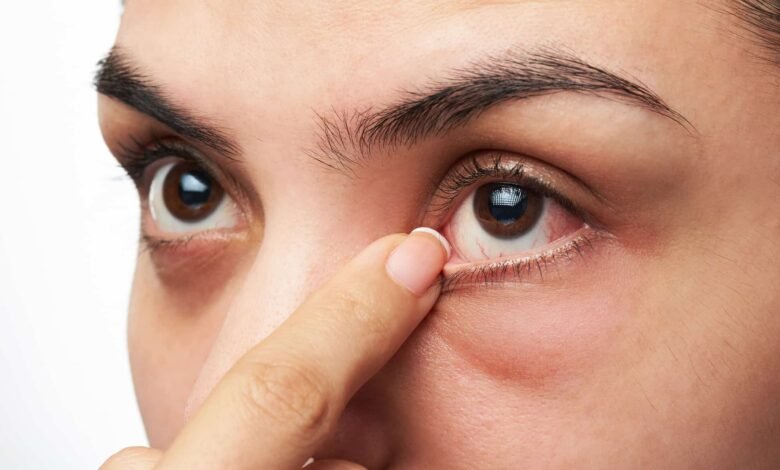
Our eyes are one of the most important organs in our body, but we often take them for granted until something goes wrong. The truth is, your eyes can reveal a lot about your overall health and well-being.
That’s why it’s crucial to pay attention to any warning signs of unhealthy eyes. In this blog post, we’ll explore some of the main signs you should be aware of so that you can take action before it’s too late!
So sit back, relax, and let’s dive into this vital topic together.
Blurry or Distorted Vision
Blurry or distorted vision is one of the most common signs of unhealthy eyes. It can be caused by a variety of factors, including:
- eye strain
- nearsightedness
- farsightedness
- cataracts
- glaucoma
If you notice that your vision is blurry or distorted, it’s essential to get an eye exam from a qualified optometrist. They will be able to identify the underlying cause of your symptoms and recommend appropriate treatment options.
In some cases, corrective lenses may be all that is needed to improve your vision. However, if you have an underlying condition like glaucoma or cataracts, surgery may be necessary to restore full visual acuity.
Eye Pain
Eye pain can be described as a dull ache or sharp stabbing sensation in and around the eye area. It can also feel like pressure or burning. There are many possible causes for eye pain, including:
- infections
- injuries
- allergies
- dryness
If you experience persistent eye pain that doesn’t go away with rest or over-the-counter treatments such as artificial tears, it’s essential to seek medical attention immediately.
Remember that prevention is always better than cure when it comes to maintaining healthy eyesight. Avoiding exposure to harsh environments and taking regular breaks from screen time can help reduce your risk of developing eye problems in the long run.
Redness
One of the most common causes of redness in the eyes is allergies. If you suffer from seasonal allergies, your eyes may become red and inflamed due to exposure to allergens such as pollen or dust.
Another cause of redness in the eyes is dry eye syndrome. When your tear production decreases, your eyes can become dry and irritated, leading to redness and discomfort. This condition is more common among people who spend long hours staring at computer screens or other digital devices.
Redness in the eyes can also be a symptom of conjunctivitis, commonly known as pink eye. This highly contagious infection can cause inflammation of the conjunctiva. This is the clear membrane that covers the white part of your eye. Conjunctivitis results to:
- itching
- burning sensation
- discharge
In some cases, redness in one or both eyes could indicate a more serious underlying health condition like glaucoma or uveitis which require immediate medical attention from an ophthalmologist.
If you experience persistent redness in your eyes accompanied by pain or blurred vision contact an optometrist right away for advice on how best to manage this type of situation before it develops into something worse.
Double Vision
Double vision, also known as diplopia, occurs when your eyes see two separate images of a single object. This can be very disorienting and make it difficult to focus on anything in particular.
There are several reasons why someone might experience double vision. It could be due to a problem with the muscles that control eye movement or an issue with the nerves that transmit visual information from the eyes to the brain. Other causes include:
- head injury
- stroke
- certain medications
- multiple sclerosis
- thyroid disease
If you experience double vision even for a short period, it’s important to seek medical attention right away. Your doctor will perform various tests and examinations to determine the cause and recommend appropriate treatment options.
In some cases, wearing glasses with special lenses or using an eye patch may help alleviate double vision. In more severe cases, surgery may be necessary to correct any muscle imbalances or nerve damage.
Dryness
Do your eyes feel dry all the time? This might be a sign of unhealthy eyes. Dryness can occur when tear production is reduced or when tears evaporate too quickly. Several varying factors can cause eye dryness, including:
- age
- Sjögren’s syndrome
- diabetes
- air conditioning
- wind
Dryness can also be a side effect of medication such as antihistamines, decongestants, and antidepressants. If you wear contact lenses or spend long hours staring at screens, this could also contribute to eye dryness.
Symptoms of eye dryness include itching, burning sensation in the eyes or around them, redness, and blurred vision. It’s important to seek medical attention if you experience these symptoms regularly.
To prevent eye dryness, make sure you blink frequently while working on screens or reading for extended periods. Use artificial tears or lubricating eye drops recommended by an ophthalmologist to keep your eyes moistened throughout the day. You may also want to purchase eyelid wipes here.
Seeing Spots or Flashes of Light
These visual disturbances are often described as tiny specks, cobwebs, or flickering lights that seem to float across the field of vision. These spots and flashes can occur for a variety of reasons such as:
- aging
- head injury
- migraines
However, they can also be caused by more serious conditions like retinal detachment or vitreous hemorrhage. Retinal detachment occurs when the retina becomes separated from its underlying tissues while vitreous hemorrhage is bleeding into the jelly-like substance that fills the back part of your eye. Both conditions require immediate medical attention.
If you experience any sudden increase in these symptoms along with loss of vision, seek medical help immediately. Remember that early detection and treatment are crucial in preventing permanent damage to your eyesight.
Be On the Lookout for Signs of Unhealthy Eyes
Watching for signs of unhealthy eyes can help you save money, avoid pain and discomfort, and protect your vision. Make sure to keep an eye out for any warning signs and contact your doctor if anything arises. Get an annual comprehensive dilated eye exam to ensure you keep your eyes healthy!
For more topics aside from eye health, visit our blog.






